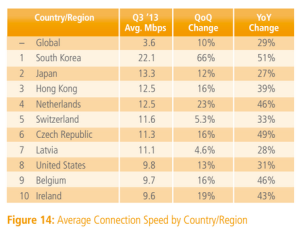If you really hate your slow Internet connection, you might consider packing your bags and moving to South Korea.
 That country’s average Internet speed is a whopping 22.1 Mbps, according to data from Akamai’s Q3 2013 “State of the Internet” report. South Korea has both the fastest speeds and the fastest growth rate: Its average connection speed jumped 51 percent year-over-year, compared to a global 29 percent speed increase over the same time period. The U.S. slightly outpaced the average growth rate, with the average speed climbing 31 percent year-over-year to 9.8 Mbps.
That country’s average Internet speed is a whopping 22.1 Mbps, according to data from Akamai’s Q3 2013 “State of the Internet” report. South Korea has both the fastest speeds and the fastest growth rate: Its average connection speed jumped 51 percent year-over-year, compared to a global 29 percent speed increase over the same time period. The U.S. slightly outpaced the average growth rate, with the average speed climbing 31 percent year-over-year to 9.8 Mbps.
“I was a little surprised at the size of the performance improvements that we saw,” report author David Belson told VentureBeat. “It’s certainly a good sign.”
Akamai’s data points to improved broadband connectivity around the world. Around 53 percent of all connections Akamai measured were greater than 4 Mbps, and around 19 percent topped 10 Mbps.
June 5th: The AI Audit in NYC
Join us next week in NYC to engage with top executive leaders, delving into strategies for auditing AI models to ensure fairness, optimal performance, and ethical compliance across diverse organizations. Secure your attendance for this exclusive invite-only event.
Mobile data traffic saw a huge spike, too, which is pretty unsurprising considering smartphone vendors shipped over a billion devices last year. Citing data collected by Ericcson, Akamai said mobile data traffic jumped 80 percent year-over-year, while mobile voice traffic remained comparatively flat.

As the overall pool of available IPv4 addresses shrink, however, Akamai’s slow IPv6 adoption figures are a little less encouraging. While enterprises continue to adopt the protocol at a fairly steady rate, some major consumer service providers are lagging. Comcast’s IPv6 traffic measured 6.9 percent, while Time Warner Cable’s was a dismal 1.8 percent. Google Fiber is leading the way worldwide with a healthy 51 percent adoption, according to Akamai.
“With more and more devices connecting to the Internet, and fewer addresses available to assign to them, we’re slowly starting to hit that crisis mode,” said Belson.
Akamai expects IPv6 adoption to continue to grow over time out of sheer necessity: There are fewer than 33.4 million IPv4 addresses left in the American Registry for Internet Numbers’ inventory.
Related articles
 America falls a dismal 31st on ranking of consumer download speeds (report)
America falls a dismal 31st on ranking of consumer download speeds (report) Akamai eyes enterprise security by snapping up DDoS protection company Prolexic for $370M
Akamai eyes enterprise security by snapping up DDoS protection company Prolexic for $370M

![Reblog this post [with Zemanta]](http://img.zemanta.com/reblog_e.png?x-id=5f028427-e891-45c8-99d9-c9ecd59ccba5)

